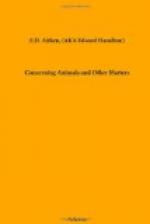Now the first and most important thing to be known respecting the Purbhoo, the fundamental fact of him, is that he is not a Brahmin. If he were a Brahmin, one essential piece of our administrative apparatus in India would be wanting, and without it the whole machinery would assuredly go out of order. Nor is it easy to see how we could replace him. Not one of the other castes would serve even as a makeshift. They are all too far removed from the Brahmin. But the Purbhoo is near him, irritatingly near him, and he has proved in practice to be just the sort of homoeopathic remedy we require, the counter-irritant, the outward blister by wise application of which we can keep down the internal inflammation.
In speaking of the Brahmin as an inflammation in the body politic I disown all offensive and invidious implications. I am only using a convenient simile. You may reverse it if you like and make the disease stand for the Purbhoo, in which case the Brahmin will be the blister. Which way fits the facts best will depend upon which caste chances at the time to be nearest to the vitals of Government.
The case stands thus. Before the days of British rule the Brahmin was the priest and man of letters, the “clerke” in short. The rajahs and chiefs were much of the same mind as old Douglas:
Thanks to Saint Bothan son of mine,
Save Gawain, ne’er could pen a line,
Gawain being a bishop. As a Mohammedan gentleman related to one of the ruling Indian princes put the matter when speaking to me a few years ago, “In those days none of us could write. Our pen was the sword. If any writing had to be done the Brahmin was called in.” And no doubt he did excellent service, being diligent, astute, and withal pliant and diplomatic. If to these qualities he added ambition, he might, and often did, become a Cardinal Wolsey in the state. In Poona, for example, the Brahmin Prime Minister gradually overshadowed the Mahratta king, and the descendant of Shivajee was put on a back shelf as Rajah of Sattara, while the Peishwa ruled at the capital.
Of course this carnal advancement was not gained without some sacrifice of his spiritual character, and the “secular” Brahmin had to bow, quoad sacra, to the penniless Bhut, or “regular” Brahmin, who, refusing to contaminate his sanctity by doing any kind of work, ate of the temple, or lived by royal bounty or private charity, and by the free breakfasts without which a marriage, “thread ceremony” or funeral in a gentleman’s house could not be respectably celebrated. Idleness and sanctity are a powerful combination, and it is written in the shastras that every day in which a holy man does no work for his bread, but lives by begging, is equal in the eyes of the gods to a day spent in fasting; so, though the prospect of power and wealth might tempt a few restless and wayward spirits, the great mass of the Brahmin caste clung to the sacred calling.




